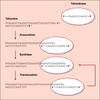| dc.contributor.author | Ouellette, MM | fr_FR |
| dc.contributor.author | Savre-Train, I | fr_FR |
| dc.date.accessioned | 2012-08-30T12:32:39Z | |
| dc.date.available | 2012-08-30T12:32:39Z | |
| dc.date.issued | 2000 | fr_FR |
| dc.identifier.citation | Ouellette, MM ; Savre-Train, I, Les télomères et le vieillissement des cellules., Med Sci (Paris), 2000, Vol. 16, N° 4; p.473-80 | fr_FR |
| dc.identifier.issn | 1958-5381 | fr_FR |
| dc.identifier.uri | http://hdl.handle.net/10608/1678 | |
| dc.description.abstract | Les cellules somatiques de
l’organisme humain cessent de se
diviser après avoir effectué un
nombre limité de mitoses. Ce
processus, appelé sénescence,
existe sous plus d’une forme. La
sénescence de type M1 touche
presque toutes les cellules de
l’organisme et l’horloge qui en
contrôle l’induction est le
raccourcissement des télomères.
Un de ses rôles essentiels est de
bloquer le processus de la
carcinogenèse et de contrer
l’apparition des cancers. Elle
aurait également des effets
secondaires nocifs puisqu’elle
semble être une cause de
vieillissement dans certains tissus
de l’organisme. | fr |
| dc.description.abstract | Most normal human cells have a finite life span. After a limited number of cell divisions, they reach a quiescent state termed senescence. During this process, cell cycle progression is blocked by the activation of p53 and the induction of p16INK4a. The onset of senescence is controlled by the shortening of telomeres that occurs each time normal human cells divide. The observation that telomeres shortening occurs in vivo suggests that senescence may play a role in the aging process. The enzyme telomerase can extend the life span of human cells by synthesizing new telomeric DNA. This enzyme, absent from most somatic tissues, contains an RNA (hTR) that serves as a template for the synthesis of telomeric DNA and a reverse transcriptase (hTERT) that provides catalytic activity. The forced expression of exogenous hTERT in normal human cells is sufficient to reconstitute telomerase activity, maintain the size of telomere and prevent the induction of senescence. During carcinogenesis, senescence is frequently inhibited by the ectopic expression of telomerase. Although senescence might be detrimental as a potential cause of aging, its evolutionary advantage is to provide an additional obstacle to the development of cancers. | en |
| dc.language.iso | fr | fr_FR |
| dc.publisher | Masson, Paris | fr_FR |
| dc.rights | Article en libre accès | fr |
| dc.rights | Médecine/Sciences - Inserm - SRMS | fr |
| dc.source | M/S. Médecine sciences [revue papier, ISSN : 0767-0974], 2000, Vol. 16, N° 4; p.473-80 | fr_FR |
| dc.title | Les télomères et le vieillissement des cellules. | fr |
| dc.title.alternative | Telomere-controlled senescence. | fr_FR |
| dc.type | Article | fr_FR |
| dc.contributor.affiliation | The Eppley Institute, The University of Nebraska Medical Center, 986805 Nebraska Medical Center, Omaha, NE 68198-6805, United States; Inserm U. 271, 151, cours Albert-Thomas, 69424 Lyon, France | - |
| dc.identifier.doi | 10.4267/10608/1678 | |







